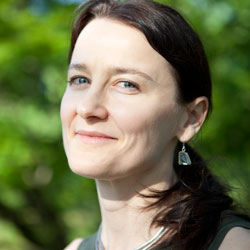When shadow falls
on my poem
I see light in it
faint stubborn
a life
tiny death
takes its first steps
matures quickly
grows
at night lies
on my heart
on my lips
like a sea chiseled
in black stone
you were screaming at night
dreadfully
frightfully
my wife says
it was death drilling corridors
within me a living being
death screaming within me
like a deserted cave
full of bones
When light falls
on my poem
I see death in it
a black grain
of ergot
in a golden head of wheat
which drifts off
beyond the horizon
September 1983
Notes on the Poem
This poem from Sobbing Superpowers: Selected Poems of Tadeusz Rozewicz, translated from the Polish by Joanna Trzeciak, is titled with a term associated with painting and other visual arts. Does this term work in poetry too? Let's examine how it is wielded by Rozewicz and Trzeciak. The definition of chiaroscuro establishes that it is a painting technique that "refers to clear tonal contrasts which are often used to suggest the volume and modelling of the subjects depicted." The strong contrast of black and white or light and dark can achieve the illusion of three dimensions in a two-dimensional form. As well, the juxtaposition of such contrasts can create emotional and psychological effects, as employed by certain artists. Although it's a poem, not a painting, Rozewicz and Trzeciak have decidedly accomplished that here. In short order, the poem takes the reader from the seeming conundrum of a shadow falling seeming to suggest light and life: When shadow falls on my poem I see light in it faint stubborn a life to the equivalent puzzle of light seeming to connote darkness and death: When light falls on my poem I see death in it a black grain of ergot Rozewicz and Trzeciak have taken the expected conventions and turned them around, to troubling effect. The final hint of an image - "a golden head of wheat" suggesting an entire field of plenty - threatened by a small speck that could turn into widespread disease, makes the poem's conclusion that more unsettling.
